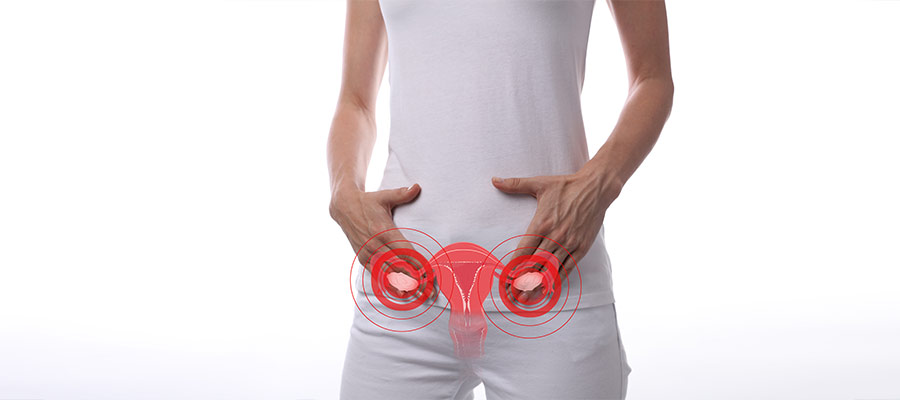Polycystic Ovary Syndrome (PCOS) – All You Need to Know by COEM in Charleston SC
Polycystic Ovary Syndrome (PCOS) is a hormonal disorder that affects women and can cause chronic health problems like heart disease or type 2 diabetes. However, early diagnosis and treatment can reduce your risk of developing those complications. Get specialized care at The Center for Occupational and Environmental Medicine (COEM). For more information, contact us today or schedule an appointment online. We are conveniently located at 7510 North Forest Drive North Charleston, SC 29420.


Table of Contents:
What is Polycystic Ovary Syndrome (PCOS)?
What causes PCOS?
Symptoms of Polycystic Ovary Syndrome
What are the 4 Types of PCOS?
How is PCOS diagnosed?
Mostly, PCOS affects women during their childbearing age (15 to 44). Women with PCOS have excess androgen levels. This hormonal imbalance can cause prolonged or infrequent menstrual periods. PCOS also affects the ovaries by preventing follicles, which contain egg cells, from developing to maturity to release egg cells, thus causing infertility.
The exact cause of the Polycystic Ovarian Syndrome is unknown. However, these factors might increase your risk for the condition:
• Heredity Insulin Resistance
• Inflammation
Symptoms of polycystic ovarian disease either develop around the first menstrual period during puberty or later following weight gain, including:
• Excess androgen levels
• Irregular periods
• Polycystic ovaries (enlarged ovaries containing follicles)
• Headaches
• Male pattern baldness
• Dark patches in the groin, neck, and under the breasts
1. Pill-Induced PCOS
Birth control pills that suppress ovulation may contribute to this type. However, you typically resume ovulating once the effects of the pill subside. It is suggested to consult your doctor if you have any concerns related to this.
2. Insulin-resistant PCOS
This is caused by excess sugar consumption, trans fats, pollution, and smoking. Insulin resistance demands the body to produce more insulin, and the extra insulin triggers the ovaries to produce more testosterone.
3. Inflammatory PCOS
Obesity, stress, and inflammatory diets like gluten and environmental toxins can cause inflammation and PCOS. It can prevent ovulation and cause hormonal imbalance, which results in excess androgen levels.
4. Hidden PCOS
Iodine, artificial sweeteners, thyroid disease, and a vegetarian diet (that causes zinc deficiency) can cause hidden PCOS.
Complications Associated with Polycystic Ovary Syndrome (PCOS)
• Infertility
• Endometrial Cancer
• Metabolic Syndrome
• Miscarriage or premature birth
• Sleep apnea
• Depression and anxiety
• Eating disorders
• Gestational diabetes
• Abnormal uterine bleeding
• Nonalcoholic Steatohepatitis
Pregnancy and PCOS
70% to 80% of women with PCOS have fertility issues. This condition also increases their risk for pregnancy complications, such as miscarriage, high blood pressure, etc. However, women with PCOS can use fertility treatments to get pregnant. Losing weight and controlling your blood sugar levels can improve the chances of having a healthy pregnancy.
Your doctor can perform the following test to diagnose PCOS:
• A Pelvic Exam– To check for problems with your ovaries and other parts of your reproductive tract
• Blood tests– To look for androgen and testosterone levels
• An ultrasound– To check for abnormal follicles and other problems with your uterus and ovaries
PCOS: When to See Your Doctor
See your doctor if you have:
• Missed your periods
• Diabetes symptoms, such as blurred vision, unexplained weight loss, and excess hunger or thirst
• Been trying to get pregnant for over 12 months but remain unsuccessful
Contact us or book an appointment today if you are looking for expert treatment for PCOS. We are conveniently located at 7510 North Forest Drive North Charleston, SC 29420. We serve patients from Charleston SC, Mount Pleasant SC, Summerville SC, North Charleston SC, Goose Creek SC, Ladson SC, Hanahan SC, James Island SC, John’s Island SC, Daniel Island SC, West Ashley SC, Moncks Corner SC, Sullivans Island SC, Folly Beach SC, Isle of Palms SC and all of South Carolina, Nationally, and Internationally. Patients routinely fly into Charleston to be evaluated by COEM and to enjoy this beautiful city, which is a Condé Nast and Travel and Leisure Top Domestic and International Tourist Destination.










